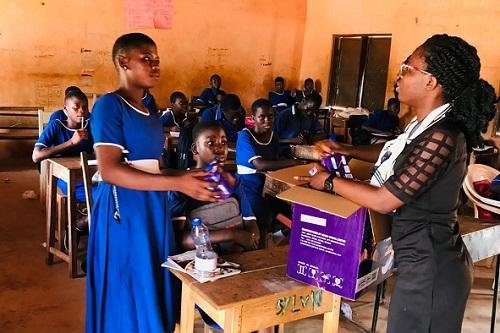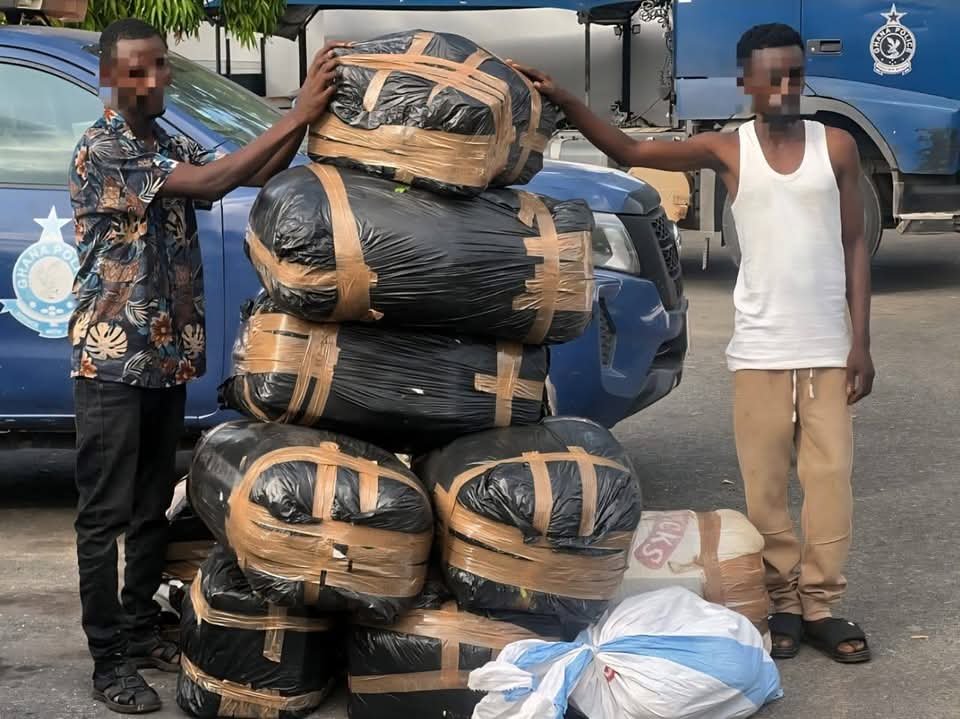News
‘Improving menstrual hygiene among girls crucial’

Emefa Kumaza donating sanitary pads to some school girls
Improving menstrual hygiene among girls is crucial because it affects school attendance as well as the engagement and performance of school girls, the Founder and Director of My Youth Led Community Organisation, Emefa Kumaza has said.
She explained that when girls were equipped to manage their menstruation safely and with confidence, it reduces the days she misses school.
Ms Kumaza said this in an interview with The Spectator on Friday in Accra as the world marks Menstrual Hygiene Day which is commemorated every year on May 28.
This year, the day was celebrated globally on the theme “together for a period friendly world,” with the aim of eliminating the stigma and taboos surrounding menstruation and live in a world where everyone can access the products, period education and period-friendly infrastructure needed.
She said consistent engagement enhances their academic performance and opens up future career opportunities and lay a foundation for economic independence.
She was of the view that addressing menstrual hygiene helps normalise menstruation and reduce the stigma leading to a more inclusive and supportive educational environment for all students
Ms Kumaza said period poverty worsens the already existing barriers to girls’ education especially in rural Ghana, explaining that many girls lack access to menstrual hygiene products, adequate sanitation facilities and accurate information about menstruation.
She said in 2021, she started an initiative known as ‘Her Period Matters’ and distributed over 3000 sanitary pads and organised educational workshops.
“These efforts not only help with immediate needs but also empower girls with knowledge about their bodies, challenging taboos and enhance their confidence,” Ms Kumaza said.
She said the initiative had worked with five schools in the Northern regional capital, Tamale with monthly distributions of sanitary pads, adding that “we have moved on to setting up pad banks in collaboration with school authorities.
She called on government to abolish taxes on menstrual products and make it freely available in schools, saying that when implemented, it would ensure that menstruation would not impede the education of girls.
By Jemima Esinam Kuatsinu
News
Police arrest two suspects for possession of suspected narcotic substance at Ayi Mensah

The Ghana Police Service has arrested two suspects for possession of eleven (11) large compressed sacks of a substance suspected to be narcotics at Ayi Mensah in the Greater Accra Region.
The suspects, Mathew Narkotey and Augustine Teye, were arrested by a team from the National Operations Department (NOD) on June 7, 2025 during routine patrols. The suspects were onboard a Mazda pick-up truck with registration number GT 3490-P when a search uncovered the suspected narcotic substance concealed in the vehicle.
The vehicle and the suspected substances have been impounded and are currently secured at the Joint Operations Centre for evidential purposes.
Both suspects are in police custody assisting with investigations, while efforts are underway to arrest one Martey, named by the suspects as the intended recipient of the consignment.
News
‘Thousands of Ghanaian women suffering from Obstetric Fistula’

Thousands of Ghanaian women continue to suffer in silence from Obstetric Fistula (OF) due to inadequate access to surgical treatment, the United Nations Population Fund (UNFPA) has revealed.
Dr Wilfred Ochan, UNFPA’s Country Representative, disclosed that over the past decade, Ghana has accumulated a backlog of more than 12,000 untreated cases, despite recording an estimated 1,300 new cases each year.
He made the remarks during a visit to the New Times Corporation (NTC) in Accra to mark the International Day to End Obstetric Fistula (IDEOF).
“Only 1,000 repairs have been done in 10 years. That leaves thousands of women isolated, in pain, and excluded from society due to a condition that is both preventable and treatable,” Dr Ochan said.
He stressed the need for greater investment in surgical capacity, public awareness, and partnership, especially with the private sector— to accelerate Ghana’s efforts to eliminate the condition by 2030.
Obstetric Fistula results from prolonged or obstructed labour without timely medical care, causing a hole between the birth canal and bladder or rectum, leading to continuous leakage of urine or faeces. The consequences include stigma, chronic incontinence, and often, the death of the baby.
To help close the treatment gap, the UNFPA is working with health institutions including the Komfo Anokye and Cape Coast Teaching hospitals to scale up surgeries and outreach.
“We must not allow women to suffer lifelong trauma for simply trying to give life,” Dr Ochan urged.
The Managing Director, Mr Martin Adu-Owusu, pledged NTC’s support in raising public awareness and promoting maternal health initiatives.
“We are ready to collaborate with you to ensure that maternal deaths and issues affecting women come down to the barest minimum so that together we can achieve the UN goal to eliminating Obstetric Fistula by 2030,” he said
By Esinam Jemima Esinam







